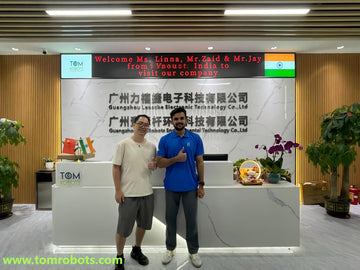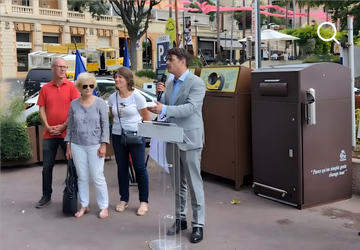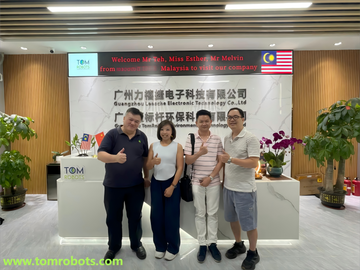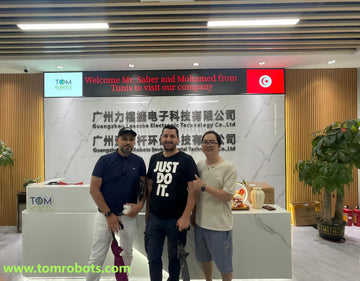Honoring Our Distinguished Guests from India: Driving Innovation and Sustainability Together
presso TomRobots su Jul 19, 2025

Introduction
The global push toward zero-waste initiatives has made smart recycling technologies indispensable, and among them, the reverse vending machine stands out as a game-changer in daily waste management. A reverse vending machine is not just a piece of equipment but a bridge between individual actions and corporate sustainability goals, making it easier for everyone to participate in recycling efforts. For businesses, integrating a reverse vending machine into their premises can significantly boost their recycling rates, as it provides a convenient and efficient way for employees and visitors to dispose of recyclable items. The reverse vending machine operates on a simple yet effective principle: it accepts used containers, processes them, and often rewards the user, creating a positive feedback loop that encourages more recycling. In busy areas like office lobbies or cafeteria corners, a reverse vending machine can handle a steady stream of recyclables, ensuring that they don’t end up in general waste bins. What makes the reverse vending machine so valuable is its ability to sort and crush items on the spot, reducing the volume of waste and making storage and transportation more efficient. For companies looking to showcase their commitment to the environment, a visible reverse vending machine sends a clear message to stakeholders that sustainability is a top priority. The reverse vending machine also generates data on recycling patterns, allowing businesses to track their progress and adjust their waste management strategies accordingly.
principle: it accepts used containers, processes them, and often rewards the user, creating a positive feedback loop that encourages more recycling. In busy areas like office lobbies or cafeteria corners, a reverse vending machine can handle a steady stream of recyclables, ensuring that they don’t end up in general waste bins. What makes the reverse vending machine so valuable is its ability to sort and crush items on the spot, reducing the volume of waste and making storage and transportation more efficient. For companies looking to showcase their commitment to the environment, a visible reverse vending machine sends a clear message to stakeholders that sustainability is a top priority. The reverse vending machine also generates data on recycling patterns, allowing businesses to track their progress and adjust their waste management strategies accordingly.  Even small to medium-sized enterprises can benefit from a reverse vending machine, as it requires minimal space and can be tailored to their specific needs. With the rise of circular economy models, the reverse vending machine has become an essential tool in closing the loop for container recycling,
Even small to medium-sized enterprises can benefit from a reverse vending machine, as it requires minimal space and can be tailored to their specific needs. With the rise of circular economy models, the reverse vending machine has become an essential tool in closing the loop for container recycling,  ensuring that materials are reused rather than discarded. Schools and universities are also adopting the reverse vending machine to educate students about recycling and instill eco-friendly habits from a young age. The reverse vending machine’s compatibility with various container types, including PET bottles and aluminum cans, makes it a versatile solution for diverse waste streams. In regions with strict recycling regulations, a reverse vending machine helps businesses stay compliant by ensuring proper disposal of recyclables. As more consumers become environmentally conscious,
ensuring that materials are reused rather than discarded. Schools and universities are also adopting the reverse vending machine to educate students about recycling and instill eco-friendly habits from a young age. The reverse vending machine’s compatibility with various container types, including PET bottles and aluminum cans, makes it a versatile solution for diverse waste streams. In regions with strict recycling regulations, a reverse vending machine helps businesses stay compliant by ensuring proper disposal of recyclables. As more consumers become environmentally conscious,  they appreciate businesses that invest in tools like the reverse vending machine, which can enhance customer loyalty and brand reputation. Over time, the reverse vending machine proves to be a cost-effective investment, as it reduces waste disposal costs and may even generate revenue through material recovery.
they appreciate businesses that invest in tools like the reverse vending machine, which can enhance customer loyalty and brand reputation. Over time, the reverse vending machine proves to be a cost-effective investment, as it reduces waste disposal costs and may even generate revenue through material recovery.
Similarly, solar power compactor bins have emerged as a revolutionary addition to smart waste management, leveraging renewable energy to optimize waste collection. A solar power compactor bin uses sunlight to power its compaction mechanism, eliminating the need for external electricity and reducing its carbon footprint. What sets the solar power compactor bin apart is its ability to hold up to five times more waste than a standard bin, thanks to its compaction feature, which means fewer collection trips are needed. The is equipped with smart sensors that monitor fill levels, sending alerts to waste management teams when it’s time for pickup, thus optimizing route planning. In outdoor spaces like parks, parking lots, and campus grounds, the solar power compactor bin thrives, as it can withstand various weather conditions while continuously harnessing solar energy. For businesses with large outdoor areas, installing a solar power compactor bin can significantly cut down on the frequency of waste collection, saving both time and fuel costs. The solar power compactor bin’s sleek and modern design makes it a visually appealing addition to any environment, avoiding the unsightly appearance of overflowing traditional bins. By using solar power, the solar power compactor bin aligns perfectly with renewable energy goals, making it a favorite among companies aiming to reduce their reliance on non-renewable resources. The solar power compactor bin’s compaction process is quiet and efficient, ensuring that it doesn’t disrupt the surrounding environment. Municipalities are increasingly turning to the solar power compactor bin to manage waste in public spaces, as it reduces the need for frequent maintenance and keeps areas cleaner. The solar power compactor bin’s smart technology also allows for data collection on waste generation patterns, helping authorities make informed decisions about waste management infrastructure. For events and gatherings, the solar power compactor bin is an ideal solution, as it can handle large amounts of waste without the need for constant emptying. The durability of the solar power compactor bin ensures that it can withstand heavy use and harsh weather, making it a long-lasting investment for any organization. By combining the functionality of waste compaction with renewable energy, the solar power compactor bin represents a significant step forward in sustainable waste management practices.
For businesses with large outdoor areas, installing a solar power compactor bin can significantly cut down on the frequency of waste collection, saving both time and fuel costs. The solar power compactor bin’s sleek and modern design makes it a visually appealing addition to any environment, avoiding the unsightly appearance of overflowing traditional bins. By using solar power, the solar power compactor bin aligns perfectly with renewable energy goals, making it a favorite among companies aiming to reduce their reliance on non-renewable resources. The solar power compactor bin’s compaction process is quiet and efficient, ensuring that it doesn’t disrupt the surrounding environment. Municipalities are increasingly turning to the solar power compactor bin to manage waste in public spaces, as it reduces the need for frequent maintenance and keeps areas cleaner. The solar power compactor bin’s smart technology also allows for data collection on waste generation patterns, helping authorities make informed decisions about waste management infrastructure. For events and gatherings, the solar power compactor bin is an ideal solution, as it can handle large amounts of waste without the need for constant emptying. The durability of the solar power compactor bin ensures that it can withstand heavy use and harsh weather, making it a long-lasting investment for any organization. By combining the functionality of waste compaction with renewable energy, the solar power compactor bin represents a significant step forward in sustainable waste management practices.
Among the most impactful innovations are Reverse Vending Machines (RVMs) and solar power compactor bins, which help businesses reduce landfill waste, lower carbon footprints, and meet ESG targets.
For companies like Ms. Linna and Mr. Zaid’s medical equipment enterprise, adopting these solutions can enhance sustainability credentials while optimizing waste management costs. This blog dives deep into how RVMs and solar bins contribute to a circular economy.
The Growing Importance of Zero-Waste Policies
With stricter environmental regulations and consumer demand for green practices, businesses must adopt closed-loop waste systems. Key benefits include:
✅ Compliance with global ESG standards
✅ Reduced operational waste costs
✅ Positive corporate image among stakeholders
Reverse Vending Machines (RVMs): A Key Tool for PET & Can Recycling
How RVMs Work
Users insert PET bottles or aluminum cans into the reverse vending machine, which then takes over the processing.
The reverse vending machine scans each item to identify its type and ensure it’s recyclable before proceeding.
Once scanned, the reverse vending machine sorts the items into separate compartments, keeping PET bottles and aluminum cans distinct.
After sorting, the reverse vending machine crushes the items to reduce their volume, making storage more efficient.
Some models of the reverse vending machine offer rewards such as discounts or vouchers to incentivize users to recycle more.
The reverse vending machine records each transaction, providing data on the number and type of items recycled over time.
Maintenance of the reverse vending machine is straightforward, with easy access to compartments for emptying recycled materials.
The reverse vending machine can be programmed to accept specific container sizes, ensuring compatibility with local recycling standards.
In high-traffic areas, multiple reverse vending machines can be installed to handle the increased volume of recyclables.
The reverse vending machine’s user-friendly interface makes it easy for people of all ages to operate, promoting widespread participation.
Some advanced reverse vending machine models connect to a cloud-based system, allowing remote monitoring of usage and performance.
The reverse vending machine can be customized with a company’s branding, turning it into a marketing tool for sustainability efforts.
Energy-efficient reverse vending machine options are available, minimizing their own environmental impact while promoting recycling.
The reverse vending machine’s presence in a facility encourages a culture of recycling among employees, fostering a more sustainable workplace.
Over time, the data collected by the reverse vending machine helps businesses identify trends in recycling behavior and adjust their strategies accordingly.
Why RVMs Are Ideal for Large Facilities
✔ High-capacity processing (500+ bottles/day) by the reverse vending machine ensures it can handle the waste generated in busy large facilities.
✔ The reverse vending machine allows for seamless integration with corporate ESG programs, providing accurate data for reporting.
✔ Real-time waste analytics from the reverse vending machine make it easy to track progress toward sustainability goals in large facilities.
✔ The reverse vending machine’s compact design means it can be placed in various locations within large facilities without taking up too much space.
✔ Large facilities with multiple departments can benefit from the reverse vending machine’s ability to track recycling by area, encouraging friendly competition.
✔ The reverse vending machine reduces the need for manual sorting of recyclables in large facilities, saving time and labor costs.
✔ In large facilities with high employee turnover, the reverse vending machine’s simple operation ensures consistent recycling practices.
✔ The reverse vending machine can be scaled up in large facilities, with additional units added as recycling rates increase.
✔ Security features in the reverse vending machine prevent misuse, ensuring that only appropriate items are recycled in large facilities.
✔ The reverse vending machine’s durability makes it suitable for the heavy usage typical in large facilities, ensuring long-term reliability.
✔ Integration with facility management systems allows the reverse vending machine to alert staff when it needs to be emptied in large facilities.
✔ The reverse vending machine helps large facilities meet waste reduction targets set by internal policies or external regulations.
✔ By centralizing recyclable collection, the reverse vending machine makes waste management more organized in large facilities.
✔ The reverse vending machine’s reward system boosts participation among employees in large facilities.
✔ The data provided by the reverse vending machine helps large facilities demonstrate their commitment to sustainability to investors and regulators.
Success Story: RVMs in Healthcare & Manufacturing
A European pharmaceutical giant reduced plastic waste by 40% after installing reverse vending machines in their offices, with employees actively using them to recycle medication bottles and packaging. The r proved particularly useful in the company’s research labs, where small plastic containers are frequently used and discarded. By placing reverse vending machines near break rooms and meeting areas, the pharmaceutical company made recycling convenient for staff, leading to high adoption rates. The data from the reverse vending machines showed that the majority of recycled items were PET bottles, prompting the company to switch to reusable water bottles for employees. The reverse vending machine’s reward system, which offered points redeemable for wellness products, motivated employees to make recycling a daily habit. Maintenance staff praised the reverse vending machine for its ease of use, as emptying the crushed materials took significantly less time than sorting through traditional bins. The success of the reverse vending machine in the main office led the pharmaceutical company to install them in their manufacturing plants, where plastic waste from production is abundant. Within six months of installing reverse vending machines in manufacturing facilities, the company saw a 35% reduction in plastic waste sent to landfills. The reverse vending machine’s ability to sort different types of plastics ensured that the recycled materials could be sold to recyclers at a higher price, generating additional revenue. Stakeholders were impressed by the transparency provided by the reverse vending machine’s data, which clearly showed the company’s progress in reducing plastic waste. Similarly, Indian industrial firms are now adopting reverse vending machines to meet sustainability KPIs, with many reporting increased employee engagement in recycling efforts. One Indian manufacturing plant saw a 25% reduction in waste disposal costs within the first year of installing reverse vending machines, thanks to reduced landfill usage. The reverse vending machine has become a centerpiece of the Indian firms’ sustainability campaigns, with tours of the facilities often highlighting the equipment to visitors. Employees in Indian industrial firms have noted that the reverse vending machine has made recycling more straightforward, eliminating confusion about which items can be recycled. The success of reverse vending machines in both European and Indian companies demonstrates their versatility and effectiveness in reducing plastic waste across different industries and regions.
Solar Power Compactor Bins: The Future of Waste Collection
How Solar Power Compactor Bins Improve Sustainability
Solar panels on the solar power compactor bin capture sunlight during the day, storing energy in batteries to power the compaction mechanism, ensuring continuous operation even at night.
The solar power compactor bin’s compaction feature increases its capacity by up to five times compared to standard bins, reducing the number of collection trips required.
Smart sensors in the solar power compactor bin monitor fill levels and send real-time alerts to waste management teams, ensuring that bins are only collected when full.
By using solar power, the solar power compactor bin eliminates the need for electrical connections, making it easy to install in remote or outdoor locations without access to power sources.
The solar power compactor bin’s energy efficiency means it can operate for days on a single charge, even during periods of cloudy weather, ensuring reliable performance.
The compaction process in the solar power compactor bin is designed to be gentle on recyclables, preserving their quality for later processing if the bin is used for mixed waste.
The solar power compactor bin’s sealed design prevents odors from escaping, keeping the surrounding area clean and hygienic, which is especially important in public spaces.
By reducing the frequency of waste collection, the solar power compactor bin lowers fuel consumption and carbon emissions from collection vehicles, contributing to overall sustainability.
The solar power compactor bin’s durable construction, including weather-resistant materials, ensures it can withstand rain, snow, and extreme temperatures, making it suitable for all climates.
The data collected by the solar power compactor bin, such as fill times and waste volume, helps businesses and municipalities optimize their waste management routes and resources.
The solar power compactor bin’s low maintenance requirements, thanks to its robust design and energy-efficient components, reduce the need for frequent repairs and replacements.
Using renewable energy, the solar power compactor bin aligns with global efforts to transition to clean energy sources, making it a sustainable choice for waste management.
The solar power compactor bin can be integrated with other smart city technologies, creating a connected waste management system that improves overall efficiency.
In areas prone to waste overflow, the solar power compactor bin’s large capacity ensures that waste remains contained, preventing litter and reducing the risk of pest infestations.
The solar power compactor bin’s contribution to reducing carbon emissions and improving waste management efficiency makes it a key tool in achieving sustainability goals for communities and businesses alike.
Industries That Benefit Most from Solar Power Compactor Bins
🏢 Corporate campuses with large outdoor areas benefit greatly from the solar power compactor bin, as it reduces the need for frequent waste collection across sprawling grounds.
🏢 The solar power compactor bin is ideal for corporate campuses with sustainability initiatives, as it aligns with their goals of reducing environmental impact and promoting renewable energy.
🏥 Hospitals & medical facilities find the solar power compactor bin valuable for managing waste in outdoor areas like parking lots and patient gardens, where hygiene is a priority.
🏥 The sealed design of the solar power compactor bin prevents the spread of odors and bacteria, making it a safe choice for hospitals and medical facilities.
🛍️ Shopping malls & public spaces with high foot traffic rely on the solar power compactor bin to handle large volumes of waste without constant emptying, keeping areas clean for visitors.
🛍️ The solar power compactor bin’s attractive design complements the aesthetic of shopping malls, enhancing the overall visitor experience while managing waste effectively.
🎡 Amusement parks and tourist attractions use the solar power compactor bin to manage waste in outdoor areas, ensuring that guests can enjoy the facilities without encountering overflowing bins.
🎡 The solar power compactor bin’s ability to operate off-grid is particularly useful in amusement parks, which often have large areas without easy access to electrical outlets.
🏫 Schools and universities benefit from the solar power compactor bin, as it teaches students about renewable energy and sustainable waste management while handling campus waste.
🏫 The solar power compactor bin in schoolyards and campus grounds reduces the need for staff to empty bins frequently, allowing them to focus on other tasks.
🏭 Manufacturing facilities with outdoor storage areas use the solar power compactor bin to manage waste generated by outdoor operations, keeping workspaces organized.
🏭 The durability of the solar power compactor bin makes it suitable for manufacturing facilities, where it can withstand heavy use and exposure to industrial environments.
🌳 Parks and recreational areas rely on the solar power compactor bin to keep green spaces clean, with its solar-powered operation fitting seamlessly into natural settings.
🌳 The solar power compactor bin in parks reduces the carbon footprint of waste collection, aligning with efforts to preserve natural environments.
🏪 Retail stores with outdoor seating areas or parking lots use the solar power compactor bin to manage customer waste, ensuring that these spaces remain tidy and inviting.
Case Study: Solar Power Compactor Bins in India
A tech park in Bangalore cut waste collection costs by 50% after deploying TomRobots’ solar power compactor bins, which proved to be a game-changer for their waste management strategy. The solar power compactor bin’s large capacity meant that collection trucks visited the tech park half as often as before, significantly reducing fuel and labor expenses. Employees at the tech park noted that the solar power compactor bin kept outdoor areas cleaner, as there was no more overflowing waste, improving the overall work environment. The smart sensors in the solar power compactor bin allowed the tech park’s facility management team to optimize collection routes, ensuring that trucks only visited bins that were full, saving time and resources. The solar power compactor bin’s use of renewable energy aligned with the tech park’s commitment to sustainability, enhancing its reputation as an eco-friendly workplace. Over the first year of using the solar power compactor bin, the tech park reduced its carbon emissions from waste collection by 40%, exceeding its sustainability targets. Maintenance of the solar power compactor bin was minimal, with the tech park’s staff only needing to empty the bins occasionally and perform basic checks on the solar panels. The data collected by the solar power compactor bin helped the tech park identify peak waste generation times, allowing them to adjust their waste management practices accordingly. Visitors to the tech park were impressed by the solar power compactor bin, with many inquiring about the technology for their own organizations, showcasing its potential for wider adoption. The success of the solar power compactor bin in the tech park led to other businesses in Bangalore expressing interest in installing similar systems, creating a ripple effect in the region. The solar power compactor bin’s durability was tested during Bangalore’s monsoon season, and it performed reliably, withstanding heavy rain and humidity without issues. The tech park’s management reported that employee satisfaction with the workplace environment increased after the installation of the solar power compactor bin, as the outdoor areas were cleaner and more pleasant. The solar power compactor bin’s integration with the tech park’s existing smart management system allowed for centralized monitoring of all waste bins, simplifying operations. By reducing the number of collection trips, the solar power compactor bin also reduced traffic congestion around the tech park, benefiting the local community. The success story of the solar power compactor bin in Bangalore’s tech park demonstrates how innovative waste management solutions can deliver both economic and environmental benefits.
Combining RVMs & Solar Power Compactor Bins for Maximum ESG Impact
For companies serious about zero-waste goals, a dual-system approach works best:
RVMs for recyclables (PET, cans)
Solar power compactor bins for general waste
This combination ensures maximum landfill diversion while minimizing carbon emissions.
Why Choose TomRobots for Your ESG Waste Solutions?
Customizable RVM & solar power compactor bin systems
End-to-end installation & maintenance
Data-driven ESG reporting tools
Ms. Linna and Mr. Zaid’s company is already exploring these solutions—will you be next?
SEO & Keyword Optimization
Primary Keywords: RVM, solar power compactor bin, solar bin
Secondary Keywords: ESG compliance, PET recycling, zero-waste, smart waste management



